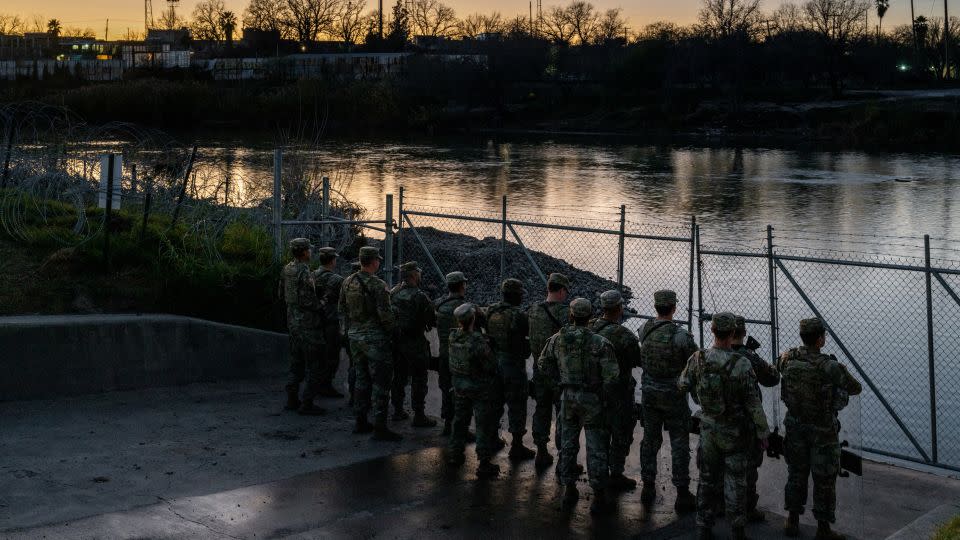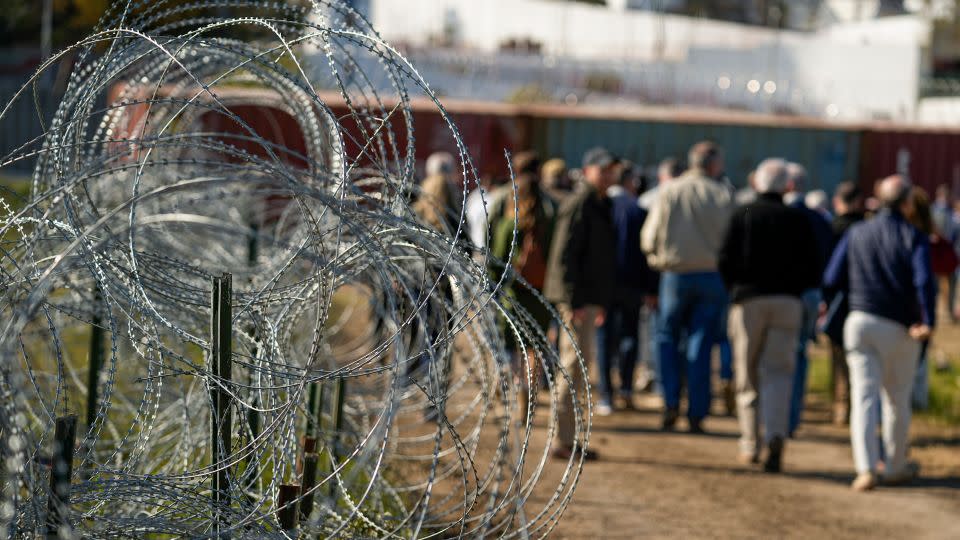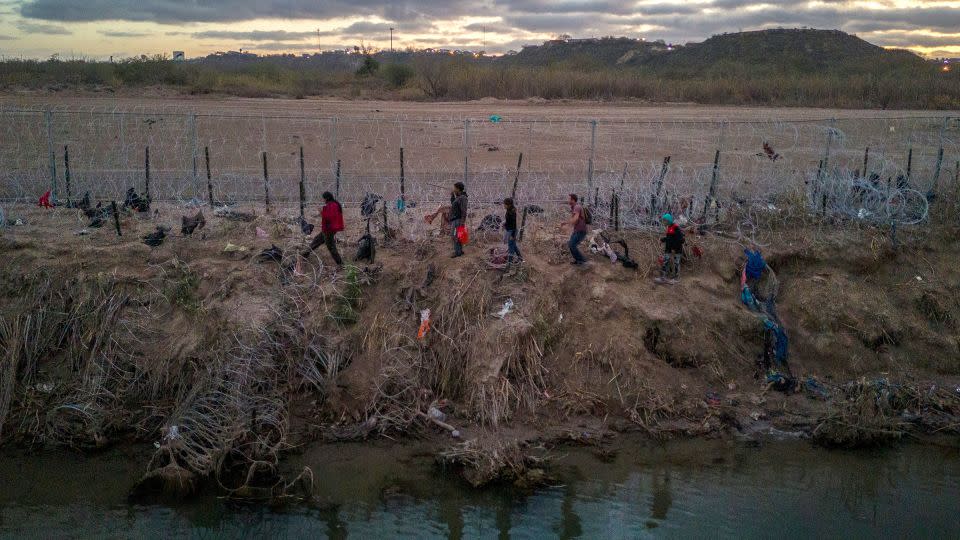Texas seized part of the US-Mexico border and blocked federal Border Patrol agents. Here’s what happened next
- Oops!Something went wrong.Please try again later.
- Oops!Something went wrong.Please try again later.
Eagle Pass, Texas, has turned into the epicenter of a growing feud between Texas and federal authorities over how to tackle the migrant crisis and who has jurisdiction over that part of the US-Mexico border.
The dispute intensified on January 10, when Texas authorities effectively blocked US Border Patrol agents from a 2.5-mile area in Eagle Pass, which had seen a surge of migrant crossings. This area includes Shelby Park, a city park on the Rio Grande that is now fenced off with gates and razor wire – impeding the Border Patrol’s access.
After the Texas Military Department “seized and secured Shelby Park,” two children and a mother drowned in a nearby part of the Rio Grande on January 12. Texas and US officials accused each other of contributing to the circumstances surrounding the tragedy. And more unexpected events have since unfolded.
Here’s a timeline of the ongoing fracas at Eagle Pass:
Wednesday, January 10:
The Texas National Guard blocked the Border Patrol from placing mobile surveillance equipment inside Shelby Park, according to Robert Danley, lead field coordinator for US Customs and Border Protection for the Del Rio area.
Additionally, Texas stated denying the Border Patrol from accessing several miles of the border, a law enforcement source familiar with operations told CNN. Around that time, state authorities started erecting razor wire, fencing and gates to shut off access to Shelby Park, an adjoining golf course and an area under the port of entry bridge federal agents had been using as a waiting area for migrants.
Friday, January 12:
At around 8 p.m. CT, Mexico’s National Institute of Migration learned about the drowning deaths of two children and a woman, which occurred in the area of the Shelby Park boat ramp, Danley wrote.
Around 9 p.m. CT, a Border Patrol supervisor from the Eagle Pass station was informed of the three drownings, Danley said in a declaration to the US Supreme Court. Mexico’s National Institute of Migration also told the Border Patrol supervisor two other migrants were in distress on the US side of the Rio Grande, near the Shelby Park boat ramp, Danley said.
“The Acting Border Patrol Supervisor responded to the Shelby Park entrance gate, which was closed upon his arrival,” Danley wrote.
“From the outside of the gate, the Acting Border Patrol Supervisor advised three guardsmen from the Texas National Guard (TNG) through the gate three migrants drowned earlier in the evening and two were in distress on the U.S. side of the river,” Danley continued.
“The gate remained closed during the conversation, and the TNG guardsmen advised the Acting Supervisory Border Patrol Agent through the gate they had been ordered not to let Border Patrol in through the gate or give Border Patrol access to Shelby Park.”
According to Danley, the Texas National Guard member told the acting Border Patrol supervisor “they had been ordered not to let Border Patrol in through the gate or give Border Patrol access to Shelby Park.”
The Border Patrol supervisor then asked to speak with a Texas National Guard supervisor and again relayed the information that three migrants had drowned earlier in the evening and two migrants were in distress on the US side of the Rio Grande, Danley said.
The guard staff sergeant allegedly said Border Patrol was not allowed in the area, “even in emergency situations.” Instead, the staff sergeant sent Texas guardsmen to investigate, Danley wrote.

Saturday, January 13:
Mexico’s National Institute of Migration told the Border Patrol’s Del Rio Sector seven migrants – in two groups – had tried to cross the Rio Grande the night before, Danley wrote.
The first group included five migrants: a mother and two children who drowned, plus two migrants who were rescued by Mexico’s National Institute of Migration. “Mexican officials were able to recover the bodies of the drowned mother and two children,” Danley wrote.
The second group of migrants included two men who made it to the US side of the river. These two men were rescued by Mexican authorities.
Also on January 13, Texas allowed Border Patrol access to the boat ramp in the Shelby Park area, but with restrictions, such as requiring information about each Border Patrol agent entering the area and offering limited access to the agency.
Monday, January 15:
A Border Patrol agent drove through an access road within the roughly 2.5-mile area, Danley wrote, but the agent was stopped and questioned by a Texas National Guard member.
Also on January 15, the Biden administration submitted a filing to the Supreme Court including details of the migrant drownings on January 12.
The drownings – as well as the rescue of two other migrants on the US side of the Rio Grande by Mexican authorities – “underscore that Texas is firm in its continued efforts to exercise complete control of the border and land” in the area “and to block Border Patrol’s access to the border even in emergency circumstances,” the administration wrote.
“It is impossible to say what might have happened if Border Patrol had had its former access to the area – including through its surveillance trucks that assisted in monitoring the area,” US Solicitor General Elizabeth Prelogar wrote in the Supreme Court filing.
“At the very least, however, Border Patrol would have had the opportunity to take any available steps to fulfill its responsibilities and assist its counterparts in the Mexican government with undertaking the rescue mission. Texas made that impossible.”
Prelogar urged the Supreme Court to intervene.
Wednesday, January 17:
The US Department of Homeland Security set this date as the deadline for when Texas authorities must end its blockade of Eagle Pass and allow federal agents to resume operations in the area. If Texas did not agree to comply by the end of the day, DHS said it would “refer the matter to the Department of Justice for appropriate action.”
But Texas Attorney General Ken Paxton’s office doubled down, saying “Texas will not surrender.”
In a scathing three-page letter to the DHS general counsel, Paxton rebutted some of the federal government’s claims as “false.” Paxton said Border Patrol agents do indeed have access to Shelby Park to respond to medical emergencies.
And on the night the three migrants drowned, “TMD (Texas Military Department) did not prevent U.S. Border Patrol from entering Shelby Park to attempt a water rescue of migrants in distress,” Paxton wrote.
“The federal agents at the gate did not even have a boat, and they did not request entry based on any medical exigency. Instead, the federal agents told TMD’s staff sergeant that Mexican officials had already recovered dead bodies and that the situation was under control,” Paxton’s letter said.
“Texas’s Guardsmen nevertheless made a diligent search, only to confirm that Mexican officials had recovered the migrants’ bodies, downriver from the Shelby Park boat ramp and on their side of the river.”
Also on January 17, Texas authorities started arresting migrants at Shelby Park and charging them with criminal trespassing – marking the state’s first arrests of migrants since Texas took control of the area one week earlier, an official said.
Monday, January 22:
The Supreme Court voted 5-4 to allow Border Patrol agents to remove razor wire set up by Texas’ governor.

Texas had sued to stop Border Patrol agents from cutting the concertina wire last year, saying it illegally destroyed state property and undermined security.
The Department of Homeland Security welcomed the Supreme Court order.
“Enforcement of immigration law is a federal responsibility. Rather than helping to reduce irregular migration, the State of Texas has only made it harder for frontline personnel to do their jobs and to apply consequences under the law,” a DHS spokesperson said.
“We can enforce our laws and administer them safely, humanely, and in an orderly way.”
But Texas’ governor said he’s not backing down.
“This is not over. Texas’ razor wire is an effective deterrent to the illegal crossings Biden encourages,” Texas Governor Greg Abbott posted on X. “I will continue to defend Texas’ constitutional authority to secure the border and prevent the Biden Admin from destroying our property.”
Tuesday, January 23:
The US Department of Homeland Security sent a letter to Texas’ attorney general reiterating the federal government’s demand that state authorities fully reopen the Shelby Park area to Border Patrol agents.
This time, the DHS general counsel cited the Supreme Court’s ruling allowing federal authorities to cut or remove razor wire and argued it had the legal right to access disputed areas in Eagle Pass.
“Pursuant to federal law enabling the U.S. government to condemn property rights essential to control and guard the borders of the United States, 8 U.S.C § 1103(b), the Department acquired permanent real estate interests in and around Eagle Pass in 2008 to support the construction and maintenance of border barriers in and around the Shelby Park area,” the DHS wrote to Paxton.
“For much of the property … the Department acquired fee simple interest from the City of Eagle Pass via condemnation as well as from private landowners.”

Wednesday, January 24:
A CNN team in Eagle Pass witnessed members of the Texas National Guard installing more anti-climb fencing and razor wire in the Shelby Park area. The wire has kept both migrants and Border Patrol out of the area.
The federal government does not have immediate plans for a massive removal of the razor wire in the Eagle Pass area unless the situation changes drastically or unless there’s an emergency, a law enforcement source familiar with operations told CNN.
But after the Supreme Court’s recent ruling, federal law enforcement will cut or remove the wire as needed to enforce immigration laws and in the case of medical emergencies, the source said.
Another enforcement source told CNN Tuesday federal agents were standing ready to breach the fencing to render aid to any individual in distress or if otherwise deemed “operationally necessary”
Also on Wednesday, Texas’ governor issued a statement accusing President Joe Biden of failing to fulfill his constitutional duty to protect the nation’s borders.
“By wasting taxpayer dollars to tear open Texas’s border security infrastructure, President Biden has enticed illegal immigrants away from the 28 legal entry points along this State’s southern border — bridges where nobody drowns — and into the dangerous waters of the Rio Grande,” Abbott wrote.
Friday, January 26:
This is the second deadline set by the Department of Homeland Security for Texas to agree to fully reopen disputed parts of the Shelby Park area to federal Border Patrol agents.
“By January 26, 2024, please confirm that the State will provide U.S. Border Patrol with the access described above,” DHS General Counsel Jonathan E. Meyer wrote in a letter to Paxton. “If the State refuses the requested access in part, but not in whole, please specify what access you intend to deny.”
Monday, January 29:
More than two dozen attorneys general signed a letter of support for the state of Texas’ fight to secure its border, addressed to Biden and DHS Secretary Alejandro Mayorkas.
“Governor Abbot’s [sic] efforts to secure our border, and Attorney General Paxton’s work defending those efforts, must be supported rather than opposed. We are a nation of laws. And without a border, we would quickly cease to be a nation at all,” the letter said.
The 26 attorneys general from Iowa, Utah, Alabama, Alaska, Arkansas, Florida, Georgia, Idaho, Indiana, Kansas, Kentucky, Louisiana, Mississippi, Missouri, Montana, Nebraska, New Hampshire, North Dakota, Oklahoma, Ohio, South Carolina, South Dakota, Tennessee, Virginia, West Virginia and Wyoming all signed the letter. Leadership from the state legislature of Arizona also signed the letter.
“I want to thank my colleagues from across the country for their support as Texas does the job that Biden refuses to do,” Paxton said in a news release. “The invasion, encouraged by Biden’s refusal to follow federal statutory law, is the biggest threat facing this country. Texas will continue doing everything in her power to close the border and protect America.”
Friday, February 16:
Abbott announced plans to build an 80-acre base to house up to 1,800 Texas National Guard members near Eagle Pass.
“Before now, the Texas National Guard had been scattered across this entire region in cramped quarters, away from fellow soldiers and sometimes traveling long distances to do their job,” the governor said.
The base camp will have the ability to expand and incorporate up to 2,300 personnel, he said.
Thursday, February 29:
Former President Donald Trump is scheduled to visit Eagle Pass – the same day Biden is expected to visit another border city in Texas.
The 2024 presidential candidates are set to make appearances about 300 miles apart. Trump is expected to deliver remarks in Eagle Pass, and Biden is expected to meet with US Border Patrol agents, law enforcement and local leaders in Brownsville.
CNN’s Devan Cole, Priscilla Alvarez, Michael Williams, Kristen Holmes, MJ Lee, Josh Campbell, Joe Sutton and Anna-Maja Rappard contributed to this report.
For more CNN news and newsletters create an account at CNN.com

